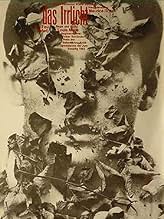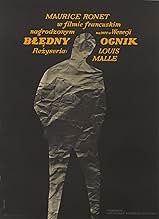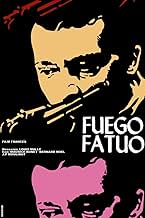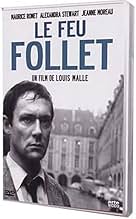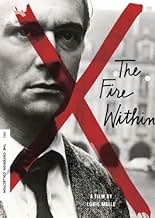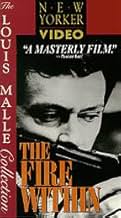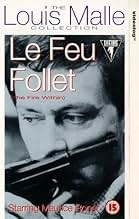Depressed Alain Leroy leaves the clinic where he was detoxified. He meets friends, acquaintances and women, trying to find a reason to continue living. Will this help him?Depressed Alain Leroy leaves the clinic where he was detoxified. He meets friends, acquaintances and women, trying to find a reason to continue living. Will this help him?Depressed Alain Leroy leaves the clinic where he was detoxified. He meets friends, acquaintances and women, trying to find a reason to continue living. Will this help him?
- Director
- Writers
- Stars
- Awards
- 2 wins & 2 nominations total
René Dupuy
- Charlie
- (as René Dupuis)
- Director
- Writers
- All cast & crew
- Production, box office & more at IMDbPro
Featured reviews
10paula-60
This is a mesmerising film about suicide as a rational way out. Ronet is wonderful in the role, sweetly sad, boyishly charming, tragically self-aware. His loving, well-meaning friends he visits on the way to the final "checking-out" are an interesting study and their inability to connect with Ronet or perceive where he's heading is poignant. For me, the best Louis Malle ever. The choice of music is great as well.
Le Feu Follet or "Will o'the wisp" as it can be translated into English is one of the most important philosophical films made by the great master of French cinema Louis Malle.It is based on a book written by Pierre Drieu la Rochelle who was influenced by Dadaism. Although this film talks of a difficult albeit dark theme of suicide the film's overall mood is not at all gloomy. This is because there are plenty of scenes infused with day to day humor.The film is about a protagonist who has lost all interest in life.Maurice Ronet,a major French film star of the sixties plays the lead role.He is a sort of celebrity among his circle of socialites and he is fed up of their useless company.The film portrays the last days of a person suffering from a drug habit.In some ways this film is an attack on middle class or French bourgeoisie.Although the protagonist is a part of it,he nevertheless makes vain attempts to untangle himself from it.If a separate genre of suicide films is formed, this film will easily find a proud place in that category.
THE FIRE WITHIN is a drama about a former alcoholic, who is at the crossroads between life and death in a state of a deep depression. It is based on the novel "Will O' the Wisp" by Pierre Drieu La Rochelle.
Alain, a recovering alcoholic at a rehabilitation clinic in Versailles suffers with a depression. He often thinks about suicide, but still tries to find some valid reasons for living. He is in complete contrast with a behavior of his friends, which further enhances his internal conflict...
Mr. Malle gently touches sore points of a depressed man. His hero is empty and defeated man, who is trapped between a drunken past and an uncertain future. Many of the protagonists, who are full of compassion and love, going through his frustrating life. He's a lost soul, who can not let go of his depressive everyday life. However, a man, without an imagination and love, must find his own peace and certainty. A recovery from alcohol is an ironic view of a collapsed life.
Regardless of a state of his mind and heart, his tragic appearance is not quite clear. This is a kind of flaw of this film, because the main protagonist has condemned himself to a tragic end, before he has considered any options. An authentic scenery emphasizes his escape from any opportunities in life.
Maurice Ronet as Alain Leroy has offered a convincing performance. He is a lonely man who helplessly wanders...search, and then run away from love and certainty.
Life is a kind of agony in this case.
Alain, a recovering alcoholic at a rehabilitation clinic in Versailles suffers with a depression. He often thinks about suicide, but still tries to find some valid reasons for living. He is in complete contrast with a behavior of his friends, which further enhances his internal conflict...
Mr. Malle gently touches sore points of a depressed man. His hero is empty and defeated man, who is trapped between a drunken past and an uncertain future. Many of the protagonists, who are full of compassion and love, going through his frustrating life. He's a lost soul, who can not let go of his depressive everyday life. However, a man, without an imagination and love, must find his own peace and certainty. A recovery from alcohol is an ironic view of a collapsed life.
Regardless of a state of his mind and heart, his tragic appearance is not quite clear. This is a kind of flaw of this film, because the main protagonist has condemned himself to a tragic end, before he has considered any options. An authentic scenery emphasizes his escape from any opportunities in life.
Maurice Ronet as Alain Leroy has offered a convincing performance. He is a lonely man who helplessly wanders...search, and then run away from love and certainty.
Life is a kind of agony in this case.
One of the triumphs of the otherwise often overrated nouvelle vague,Louis Malle's adaptation of a Drieu de la Rochelle has not aged bit.Thanks to Maurice Ronet ,who portrays a suicidal man,probably the most beautiful performance of this kind.The movie is nothing but a long wandering in a mental hospital,in the Parisian bistros,in the posh world where an Antonioniesque bourgeoisie is killing time (see Alexandra Stewart's character).If I mention Antonioni,it''s not by chance ;actually Malle succeeds here where Antonioni only partially does.The difference ,I think,lies in the fact that we have here a human being,made of flesh and blood,who exists,and I would like to point out once again what a great actor the late Maurice Ronet was.Eric Satie's music perfectly captures the doomed atmosphere.This is arguably Louis Malle 's finest,one of the rare movies which achieve the delicate balance between the strong screenplay and the "liberties" dear to the new wave creators. Yes the new wave did produce great movies:"la tête contre les murs " (Franju)"Cléo de 5 à 7" (Varda)"Lola" (Demy)and this one are jewels on its crown.
A bleak character study of a recovering alcoholic who has lost all hope and decides to kill himself. The film follows him over the course of a couple of days as he wanders about the streets, running into and saying goodbye to former acquaintances. One senses that he's trying out of a last ditch sense of desperation to tease out of these people some hint of how they manage to find things worth living for, but their secrets remain elusive. He carries out his plan, and the film makes the rather unsettling suggestion that some never find anything worth living for.
Not a comforting thought for those who struggle through depressions of their own and look to the positive messages so often found in films to buoy their hopes. But then this movie is not intended to be comforting. It's quiet, lonely, and depressing, but it's also a bit refreshing that director Louis Malle resists a happy resolution and instead stays committed to depicting life the way it actually plays out for some rather than the way the movies would have us believe it does.
Grade: A
Not a comforting thought for those who struggle through depressions of their own and look to the positive messages so often found in films to buoy their hopes. But then this movie is not intended to be comforting. It's quiet, lonely, and depressing, but it's also a bit refreshing that director Louis Malle resists a happy resolution and instead stays committed to depicting life the way it actually plays out for some rather than the way the movies would have us believe it does.
Grade: A
Did you know
- TriviaFor the first two days, filming was done in color. However, director Louis Malle realized that this was a distraction from the story, so he decided to film in black-and-white. An assistant also later declared that the shooting atmosphere on the set was rather gloomy.
- GoofsAs Alain walks on the streets of Paris, the crew (pushing the dolly) is visible on the shop windows he passes by.
- Quotes
Alain Leroy: I'm killing myself because you didn't love me, because I didn't love you. Because our ties were loose, I'm killing myself to tighten them. I leave you with an indelible stain.
- SoundtracksTrois Gymnopédies
Written by Erik Satie
- How long is The Fire Within?Powered by Alexa
Details
- Release date
- Country of origin
- Official site
- Language
- Also known as
- A Time to Live and a Time to Die
- Filming locations
- Production company
- See more company credits at IMDbPro
- Runtime
- 1h 48m(108 min)
- Color
- Sound mix
- Aspect ratio
- 1.66 : 1
Contribute to this page
Suggest an edit or add missing content

![Watch Bande-annonce [OV]](https://m.media-amazon.com/images/M/MV5BODdiNzczOTktMmMxMC00ZGQ0LTg4YWItZWEzN2FkZTViODk1XkEyXkFqcGdeQXRyYW5zY29kZS13b3JrZmxvdw@@._V1_QL75_UY281_CR0)
